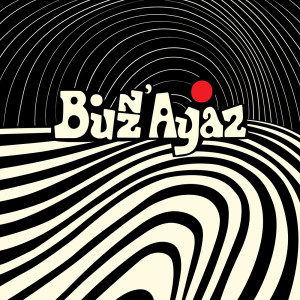 Here are a couple of ear-bending releases from the Eastern Mediterranean: one from Turkish psych veterans BaBa ZuLa, the other from Cypriot newcomers Buzz’ Ayaz. Both are from the Hamburg-based global music label Glitterbeat.
Here are a couple of ear-bending releases from the Eastern Mediterranean: one from Turkish psych veterans BaBa ZuLa, the other from Cypriot newcomers Buzz’ Ayaz. Both are from the Hamburg-based global music label Glitterbeat.
If you’re open to a dose of deeply experimental Turkish psychedelic rock rooted firmly in Anatolian tradition — and I always am — look no further than BaBa ZuLa’s latest İstanbul Sokakları (Streets of Istanbul). This one is different in many ways from, and a bit more challenging than, 2020’s Derin Derin, but it’s every bit as compelling.
To be sure, Streets of Istanbul is still constructed around driving Turkish percussion (Ümi̇t Adakale on darbuka, def, dümbek, and bendi̇r, and Mehmet Levent Akman on machines, effects, spoons, cymbals, and drums), with “glitched electronics,” dub bass (Olcay Bozkurt and Veys Çolak) and especially the psychedelically processed sounds of Turkish and Greek stringed instruments played by frontman and lead vocalist Osman Murat Ertel (electric saz, bağlama, di̇van saz, cura, tzouras), with additional vocals from Osman’s wife Esma Ertel. But for one thing, this album is directly and explicitly political, commenting on the global economic system, the rise of far-right parties globally, and issues closer to home in Turkey. (Those vocals from Esma Ertel are also a new addition as far as I recall.
Deep hypnotic grooves and lengthy jams that cycle from soothing to explosive, Osman’s vocals that leap from guttural grunts and quiet spoken lines to strident shouts, Esma’s that range from seductive whispers to piercing ululations … İstanbul Sokakları challenges the listener to contemplation, indignation, and action. The first song proper, “Arsız Saksağan” (Cheeky Magpie) is an openly anti-government song venting rage at global capitalism: “To the media that dazzles, to the journalists who are silenced, to the people imprisoned just for defending trees, birds and a civilized life.”
I think my favorite is the 11 minute jam “Yok Haddi Yok Hesabı” (No Limit No Calculation), which shifts through many moods, rising from a nearly ambient dark beginning with Osman plucking acoustic instruments, then suddenly at about the 3 minute mark adds yowling electric saz over a boosted bass. Up and down the moods go, with Osman bemoaning ills like inflation and Esma countering with whispered exhortation to remember the eternal things that make life worthwhile. The mood swings are even wider on “Yaprakların Arasından” (In Between the Leaves), like wandering Istanbul from a quiet residential neighborhood to a bustling commercial center and back again.
Interspersed are four experimental taksims, pensive improvised instrumental excursions built on lush ambient synth drones, paired with field recordings of a train station, a street bazaar, the Bosphorus waterway with its boat horns and crying gulls, and birds singing in the Ertels’ private garden.
All in all, Streets of Istanbul is a bracing sonic adventure, encompassing as many musical moods as there are moods of that ancient and vibrant city. As Ertel says: “We are embracing the past, and Turkish tradition. But it’s not enough. We are living in the 21st century and we have all the world.”
 On their debut self-titled album Buzz’ Ayaz creates something of a new style of beat-heavy Eastern Mediterranean psychedelia from the divided island of Cyprus. Their signature sound is provided by an electrified bass clarinet and an unusual blending of Greek and Turkish folk idioms and language. The members of Buzz’ Ayaz come from both the Greek and Turkish sides of Nicosia, the divided capital of Cyprus, and their music reflects the inevitable intertwining of cultures there.
On their debut self-titled album Buzz’ Ayaz creates something of a new style of beat-heavy Eastern Mediterranean psychedelia from the divided island of Cyprus. Their signature sound is provided by an electrified bass clarinet and an unusual blending of Greek and Turkish folk idioms and language. The members of Buzz’ Ayaz come from both the Greek and Turkish sides of Nicosia, the divided capital of Cyprus, and their music reflects the inevitable intertwining of cultures there.
Founder and frontman Antonis Antoniou put the band together online at first, drawing from musicians from both sides of the island and capital. Once they physically got together, they explored and jammed intensively before playing in front of audiences in Nicosia and at festivals across the island, where they immediately found fans. I mean, what’s not to like? Antoniou plays a fuzzed out amplified tsouras (Greek for a type of bouzouki called cura in Turkey), with Manos Stratis on an organ that had me thinking of Jon Lord in early Deep Purple. Rhythm comes from Ulaş Öğüç who plays his kit in a way that’s much more like regional folk percussion than rock or pop drumming, and the bottom is provided by Stratis’s bass synth and that glorious amplified bass clarinet played by Brit expat Will Scott.
It’s gritty, it’s dubby, it drones and rocks, with Antoniou’s tenor vocals cutting through the mix (and he apparently also provides the baritone harmony vocals as well).
“Yes, the music is very urban. Folk is there too but just as a bedrock layer. We represent both sides of the population. I write the lyrics, and I sometimes mix the Greek Cypriot dialect with Turkish words. All four of us are activists, and this music is a way of giving something back to the island. It doesn’t have any checkpoints or barriers. It’s simply Cypriot music.”
The folk underpinnings of the music indeed are always there, sometimes more subtle than at others. Opening track “Buzzi Ayazi” has a catchy folksy melody, a galloping beat and handclaps under a bridge verse, but also plenty of synth swirls and the delicious electrified tsouras and bass clarinet. “Fysa” starts out with a drum intro that signifies rock but the melody when it enters is very Anatolian folk. Scott’s clarinet and Öğüç’s toms open “Zali” again in rock mode but it quickly shifts into a Greek folk dance tune with an offbeat time sig. “Ate Pale” likewise has a folk dance meter to it and it’s probably the “heaviest” of the tunes with a very lumbering prog rock feel to it. “Efdji” is a good blend, with a plodding march beat and good examples of the way each instrument fits into the whole.
The album wraps with a long super-spacey jam called “Alu” that could suggest a future more electro direction for Buzz’ Ayaz. Time will tell, but this album is an amazing debut. Keep an eye out for them if you’re anywhere near the European festival circuit in 2025.
(Glitterbeat, 2024)
(Glitterbeat, 2024)
